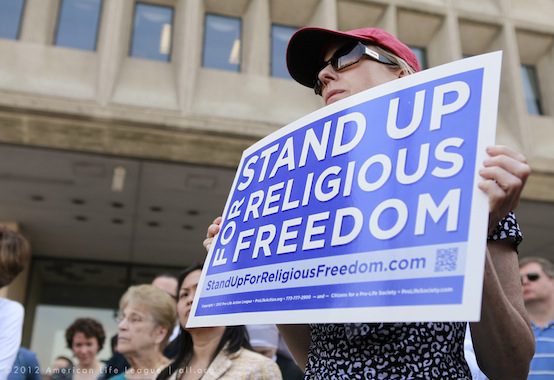A Religious Liberty Thought Experiment

Imagine that there are two leading American political parties. Imagine further that they are in general agreement on all issues except two. (That’s what makes this a true hypothetical.)
The first point of disagreement concerns religious liberty. Party A is a strong supporter of religious liberty; Party B thinks that religious liberty needs to be circumscribed in order to secure maximal equality or justice for others.
The second point of disagreement concerns foreign policy. Party B is in these matters cautious and circumspect, disinclined to adventurism, not isolationist but not interventionist either. Party A, by contrast, never met a foreign conflict it didn’t want to intervene in, and thinks what’s good for military expenditures is good for America. The more of our young men (and perhaps women) Party A can put in harm’s way thousands of miles from home the better it feels about itself. Pax Americana, world without end, y’all.
You (in this thought experiment) are a Christian and a strong supporter of religious liberty; you are also strongly opposed to unnecessary military adventures and foreign intervention more generally.
How do you vote? And on what grounds do you make that decision?
I’ve been thinking about this a good bit lately. While I am, as I have often demonstrated right here on this site, a vocal supporter of religious freedom, I’m also rather uncertain about how my religious convictions should affect my political decisions. The problem arises if we distinguish between individual and collective Christian action.
On the individual level, I know what I am supposed to do: if someone slaps me on one cheek, I should offer them the other; if someone takes my shirt, I should offer him my coat; if someone curses me, I should bless him; I should always seek the well-being of others in preference to my own. (Of course, this is not to say that I actually do what I know I should do.)
If that logic holds in the collective sphere as well, then perhaps Christian churches should not focus too much attention on what is best for them, but on what is best for their neighbors. They might have good reason, in that case, to accept constraints on religious freedom if that meant preventing unnecessary violence, death, and destruction from being unleashed on others.
Now, some Christians might also argue that the Church exists for others, so that promoting religious freedom, even at the cost of lives lost overseas, is still the selfless thing to do. And that could be right, but I think we all ought to be very wary of arguments that provide such a neat dovetailing of our moral obligations and our self-interest.
I honestly don’t know what I think about this, and still less do I know how to apply the proper principles to our own more complex political scene. But I do think it’s right to conclude that there are at least some potential circumstances in which religious believers, in order to be faithful to their religious traditions, would need to refrain from direct political advocacy for those traditions.
Alan Jacobs is a Distinguished Professor of the Humanities in the Honors Program at Baylor University in Waco, Texas, and the author most recently of The Book of Common Prayer: A Biography.
Comments